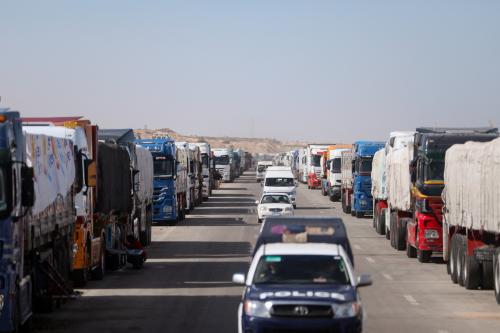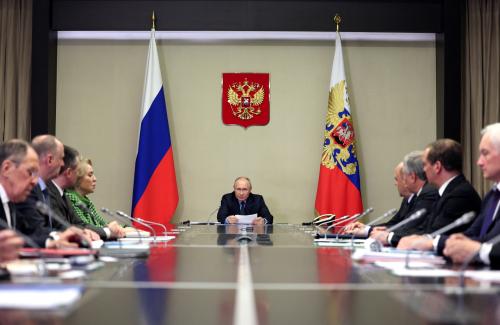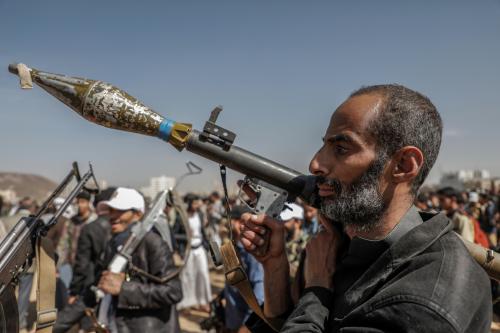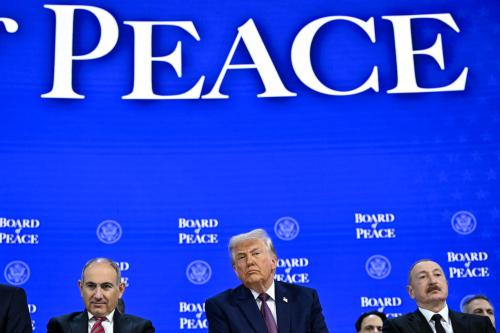This piece is part of the Center for Middle East Policy’s Israel-Gaza interviews series, in which leading experts unpack the conflict via in-depth Q&As.
A proposed U.S. defense pact with Saudi Arabia—possibly joined to a Saudi-Israeli agreement to normalize those countries’ relations—has become a centerpiece of the Biden administration’s Middle East policy. This deal would reportedly see the United States provide Saudi Arabia with security guarantees and support for a civilian nuclear program.
The U.S.-Saudi diplomatic effort
Kevin Huggard:
This U.S.-Saudi diplomatic effort, which predates the current war between Israel and Hamas in Gaza, has become associated with efforts to end that fighting. How do you understand the relationship between a U.S.-Saudi deal and efforts to reach a cease-fire in Gaza? Do you foresee a Saudi role in the reconstruction of Gaza once the fighting ends?
Andrew Leber:
Prior to October 7, a core assumption of the U.S.-Saudi diplomatic effort was that the Palestinian cause could be set aside—perhaps indefinitely. While Saudi diplomats reiterated Riyadh’s official support for Palestinian statehood, de facto ruler Crown Prince Mohammed bin Salman (or MBS) presided over indirect messaging that downplayed Saudi commitments to Palestinians and even openly acknowledged talks with the United States regarding normalization with Israel in a September 2023 interview with Fox News. “Every day, we get closer,” MBS said of what he then called “good negotiations.”
Hamas’s attacks on October 7 and Israel’s ongoing military campaign in the Gaza Strip have interrupted this trajectory, at least for now. Despite immediate and ongoing efforts by Biden administration officials to keep a deal on track, domestic Saudi commentary and official statements now emphasize Palestinian statehood as a precondition for normalization with Israel. The kingdom has called for a cease-fire since mid-October, hosting an Arab-Islamic summit in support of the same shortly thereafter. Saudi Arabia would face considerable risks to its regional reputation and domestic stability in pursuing normalization as Palestinian suffering at the hands of Israeli forces remains a major news story in Arabic-language media. There will be no joint U.S.-Saudi-Israeli agreement without a cease-fire in Gaza, and almost certainly not without clear steps toward Palestinian statehood; MBS even reiterated the kingdom’s call for the establishment of a Palestinian state during an official reception marking the Eid al-Adha religious holiday.
The “opportunity” to participate in Gaza’s reconstruction is unlikely to be an acceptable substitute concession to Saudi Arabia. Reconstruction needs are immense, and come at a time when the kingdom has already embarked on numerous expensive development projects at home and domestic narratives emphasize a “Saudi first” mentality. Worse, any rebuilt infrastructure might simply be destroyed by renewed Israeli ground or air attacks—as has happened before. Hence, while Saudi officials might pledge reconstruction aid conditional on meaningful steps toward Palestinian statehood, they are unlikely to contribute funds to prop up a shattered version of the status quo ante—to the benefit of either Israel or (more likely) a weakened but surviving Hamas.
How Saudis feel about the Palestinian cause
Kevin Huggard:
Can you describe the popular attitude toward the Palestinian cause among Saudis? And what is your understanding of the attitude of the Saudi leadership, especially Crown Prince Mohammad, toward the Palestinians and the prospect of normalization with Israel?
Andrew Leber:
Saudi popular attitudes are overwhelmingly sympathetic to the Palestinian cause, even if public display of these views (and support for almost all political causes) has been muted by heavy censorship. Normalization with Israel has likewise never been popular with the Saudi public, despite Saudi commentators enjoying greater leeway to criticize Palestinian leaders and even Palestinians themselves in recent years. Since October 7, Saudi leaders have forestalled public pressure to “do more” where Palestinians are concerned in part by staying one step ahead of public outrage—such as by opening an official fundraising campaign for state-sanctioned public donations to the Palestinian people.
Some Saudis are no doubt less invested in the Palestinian cause than past generations, with at least a few commentators openly hostile to it. MBS himself likely departs from the views of his father, King Salman, who long chaired the kingdom’s Popular Committee for Supporting the Palestinian People. MBS’ openness to closer security ties with Israel has been widely reported, and the uptick in public criticism of the Palestinian leadership almost certainly enjoys his tacit approval. MBS likely perceives pro-Palestinian activism at home as not only a hindrance to closer security cooperation with Israel and the United States but even a direct threat to his hold on power by serving as a “gateway to dissent.” This aside, MBS’ attitude toward normalization is pragmatic: he will pursue it so long as it seems to provide security or reputational dividends but will not sacrifice significant standing at home or regionally to do so.
The Saudi-Iranian relationship
Kevin Huggard:
In March 2023, Saudi Arabia and Iran resumed diplomatic relations following a seven-year break. What is the current state of the Saudi-Iranian relationship, and how does a prospective deal with Washington fit into Riyadh’s approach to that relationship?
Andrew Leber:
For decades, Saudi-Iranian relations have oscillated between uneasy coexistence and more overt antagonism. The two countries’ March 2023 resumption of diplomatic ties initially appeared to be a policy of mutual expedience. For Saudi Arabia, resuming diplomatic ties reduced its exposure to regional conflicts amid limited U.S. appetite for confronting Iran militarily—relevant not just for the kingdom’s national security, but also for its efforts to promote itself as a safe environment for foreign investments.
So far, the détente appears to be holding—and perhaps has even strengthened—amid the regional tensions of the Gaza war. MBS’ first reported call regarding the conflict was to then-Iranian President Ebrahim Raisi to discuss “the ongoing military escalation in Gaza” (per the Saudi readout), while Raisi featured prominently in the Arab-Islamic summit that Saudi Arabia organized in Riyadh the following month. Furthermore, Saudi Arabia has been spared both physical and even rhetorical attacks by Iran and its allies in the months since October 7, despite the kingdom’s ongoing security coordination with the United States and even its reported (though officially denied) role in helping to intercept an Iranian missile and drone strike against Israel in April.
Saudi Arabia is unlikely to disrupt this arrangement absent firm security assurances from the United States; even a second Trump administration would face questions from Riyadh about its commitment to the kingdom’s security. A formal defense alliance with the United States (and especially normalization with Israel) would likely attract greater criticism from Tehran and its proxies, although it is not clear that a security agreement on its own would result in Saudi leaders more openly confronting Iran.
From “pariah” to deeper ties
Kevin Huggard:
Looking back over the last four years, President Joe Biden has moved from promising to make Saudi Arabia a “pariah” on the campaign trail in 2019 to now placing deeper U.S.-Saudi ties at the core of his administration’s Middle East policy. How do you make sense of that evolution?
Andrew Leber:
Biden’s shifting approach toward Saudi Arabia reflects the difference between campaigning and governing. On the campaign trail in 2019-2020, Saudi Arabia (and particularly the murder of Saudi media figure Jamal Khashoggi in Istanbul) was the subject of extensive media coverage and closely tied to then-President Donald Trump—particularly given Trump’s full-throated defense of the kingdom’s actions. By 2022, however, the importance of Saudi human-rights abuses had faded for the Biden administration when weighed against concerns both geopolitical (securing Saudi cooperation in the response to Russia’s invasion of Ukraine) and domestic (public concerns over inflation, and especially rising fuel prices).
At the same time, Biden’s choice of advisors, limited interest in human-rights promotion elsewhere in the Middle East, and own political history suggest the administration had little interest in making Saudi Arabia a “pariah” to begin with. U.S. officials began raising normalization with Saudi counterparts as early as 2021, while back-to-back presidential visits to Israel and Saudi Arabia in the summer of 2022 emphasized the administration’s commitment to locking in a new regional security architecture centered around Gulf-Israeli security ties. Securing the “crown jewel” of Saudi-Israel normalization held clear appeal for a President both fond of noting his “ironclad” commitment to Israel’s security and eager to surpass the Trump administration’s achievements in bilateral normalization.
Balancing Washington and Beijing
Kevin Huggard:
The Biden administration seems motivated to use this deal to dissuade Saudi Arabia from deepening its ties with China. In your understanding, what is the Saudi leadership’s approach to managing its relations with Washington and Beijing?
Andrew Leber:
The Saudi-China relationship has continued to expand over the past decade, reflected in everything from high-level visits to currency-swap agreements to cooperation on scientific research. Yet while a U.S.-Saudi treaty would undoubtedly include provisions to limit or eliminate Saudi security cooperation with China, this is probably not a primary motivation for the Biden administration to begin with—at least not compared with concerns about Israel’s security and containing Iran. Per the initial draft of a now-infamous essay, National Security Advisor Jake Sullivan praised Arab-Israeli partnerships more for “free[ing] up resources” to engage in so-called great-power competition rather than as a means to expand U.S. influence at the expense of China.
To be sure, Saudi officials have emphasized their ties with China as a way to play on broader U.S. political sensitivities toward “losing” security partners to Chinese influence, even as Biden administration officials have emphasized limits on these ties to allay domestic criticism and build support for a deal. Yet Saudi leaders have typically been more responsive than Emirati counterparts to U.S. concerns about Chinese influence, and they do not view the kingdom’s improved relationship with Beijing as necessarily coming at Washington’s expense. Hence even as Saudi leaders will likely continue seeking an expanded economic relationship with China regardless of any security agreement with the United States, even more limited U.S. security commitments to Saudi Arabia might be sufficient to minimize Saudi-Chinese security cooperation.
The U.S. role in Middle East security
Kevin Huggard:
For much of his administration, Biden has sought to lessen U.S. security commitments in the Middle East and refocus on priorities elsewhere in the world. Looking toward the future, what might a possible defense pact with Saudi Arabia mean for the United States’ long-term role in the region’s security?
Andrew Leber:
A defense pact with Saudi Arabia would recommit the United States to the security architecture of the Middle East and in particular the Persian Gulf region. While this might improve existing forms of security cooperation—such as a coordinated air-defense network on display this past April—it would also risk dragging the United States further into the region’s conflicts or even incentivizing regional actors to resort to force as a means of resolving regional disputes. The past year demonstrates the extent to which the U.S.-Israel security relationship—not a treaty alliance—increases U.S. exposure to destabilizing regional conflicts while affording the United States limited influence over its security partners’ actions. Furthermore, the heavy focus on U.S.-Saudi security ties risks overlooking many other areas for improving U.S.-Saudi ties.
The U.S. political climate
Kevin Huggard:
A treaty with Saudi Arabia would require ratification in the U.S. Senate. What is your read of the U.S. political climate around such a deal, whether in Congress or the broader public?
Andrew Leber:
Two-thirds of the U.S. Senate is a high bar to clear for any country, not the least for Saudi Arabia—which has been subjected to repeated efforts to block arms sales and faced lingering suspicions over Saudi citizens’ participation in the 9/11 terrorist attacks. On the eve of the October 7 attacks, 20 Democratic senators expressed concerns that treaty obligations to Saudi Arabia risked dragging the United States further into Middle East conflicts—enough to sink a deal without significant Republican support.
Hamas’s October 7 attacks and Israel’s subsequent devastation of the Gaza Strip have done little to consolidate support for an agreement. Available polling suggests public opinion is ambivalent; in one recent poll, 30% of respondents believed a deal was in the U.S. interest, 35% believed that it was not, and a full 35% were “not sure.” This is unsurprising, given that public discussion of the deal has largely played out in the form of anonymous leaks to the Wall Street Journal rather than the kind of messaging campaign that accompanied, say, the Joint Comprehensive Plan of Action nuclear deal under the Obama administration.
Given that Saudi-Israeli normalization seems unlikely in the next year or two, some commentators—including sources close to the Royal Court—have floated the idea of a more limited security deal focused solely on U.S.-Saudi ties. Still, Senate support for treaty obligations to Saudi Arabia appears flatly impossible in the absence of a normalization deal; Democrats are likely to balk even as Republicans are unlikely to make concessions to the Biden administration with a second Trump term potentially just around the corner. This potentially results in a “less-for-less” deal—more limited U.S. security and technological assistance to Saudi Arabia that falls short of a treaty obligation, in exchange for verbal Saudi promises to continue security cooperation regarding Iran, limit some forms of security cooperation with China, and secure limited Saudi assistance with any Gazan reconstruction effort.
The Brookings Institution is committed to quality, independence, and impact.
We are supported by a diverse array of funders. In line with our values and policies, each Brookings publication represents the sole views of its author(s).







Commentary
Making sense of a proposed US-Saudi deal
July 10, 2024